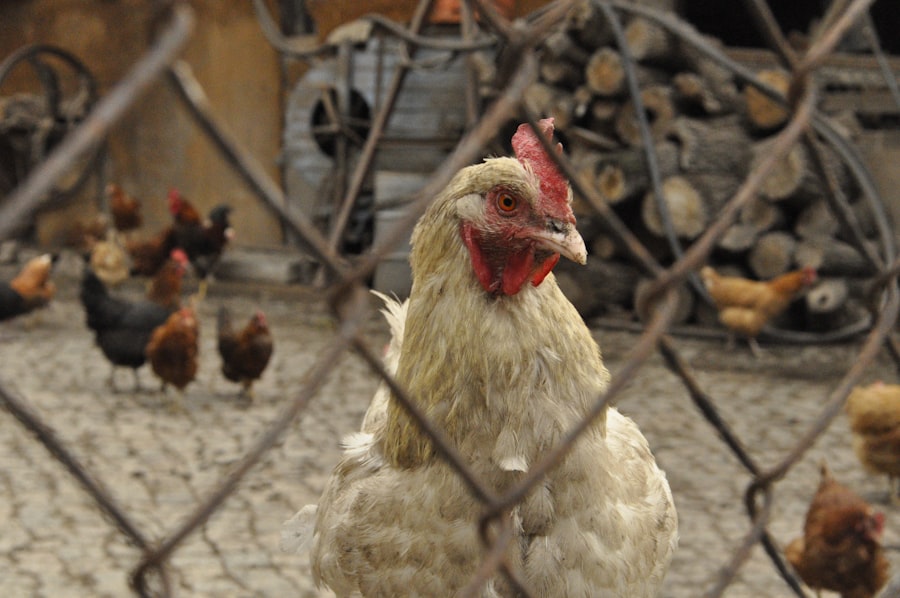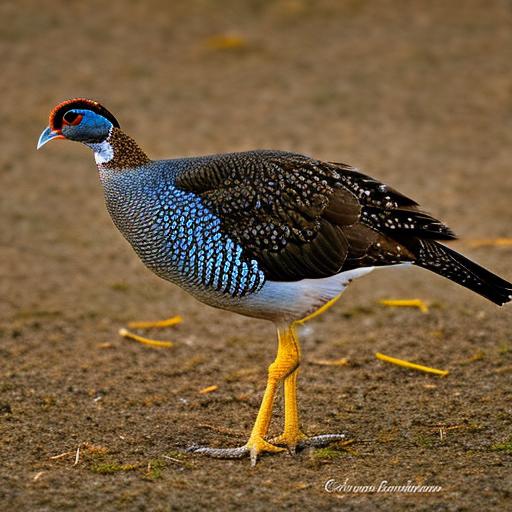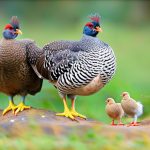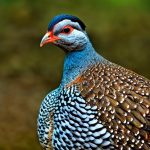Guinea fowl, also known as guinea hens, are domesticated birds that are native to Africa. They are known for their distinctive appearance, with speckled feathers and a helmet-like crest on their heads. Guinea fowl are popular for their ability to control pests in gardens and farms, as they are voracious insect eaters. They are also valued for their flavorful meat and eggs, making them a popular choice for small-scale poultry farming.
Coyotes, on the other hand, are a species of wild canine that are found throughout North America. They are highly adaptable predators that can thrive in a variety of habitats, from rural farmland to urban areas. Coyotes are known for their opportunistic hunting behavior, preying on small mammals, birds, and even domestic livestock. Their presence can be a concern for farmers and homesteaders, as they pose a threat to poultry and other small animals.
Key Takeaways
- Guinea fowl are domesticated birds known for their ability to deter predators, including coyotes.
- Coyotes are natural predators that pose a threat to poultry, making guinea fowl an effective deterrent due to their natural predatory behavior.
- Guinea fowl can deter coyotes through their loud alarm calls, aggressive behavior, and ability to alert other poultry to potential danger.
- Using guinea fowl as a natural deterrent can provide benefits such as reduced predation, lower stress levels for other poultry, and minimal environmental impact.
- When considering keeping guinea fowl as coyote deterrents, it’s important to consider their housing, feeding, and social needs, as well as their compatibility with other poultry.
The Natural Predatory Behavior of Guinea Fowl
Guinea fowl are natural foragers and hunters, with a keen instinct for detecting and capturing insects, small rodents, and other prey. They are highly alert and vigilant birds, with a strong sense of curiosity and territoriality. Guinea fowl are known to be vocal and assertive, often sounding loud alarm calls to alert their flock of potential threats. When it comes to predatory behavior, guinea fowl are known to be aggressive towards smaller animals that they perceive as threats to their territory or flock.
In the wild, guinea fowl exhibit a strong instinct for self-preservation, using their speed and agility to evade predators such as hawks, foxes, and wild cats. They are also known to roost in trees at night, using their keen eyesight and sharp calls to detect and deter nocturnal predators. Guinea fowl are highly social birds that form tight-knit flocks, providing safety in numbers and strength in unity against potential threats.
How Guinea Fowl Can Deter Coyotes
Guinea fowl have a natural ability to deter predators through their vocalizations, aggressive behavior, and flock mentality. When confronted with a potential threat such as a coyote, guinea fowl will often sound loud alarm calls to alert their flock and intimidate the predator. Their assertive nature and quick movements can startle and deter coyotes, making them think twice before attempting to approach the flock.
Additionally, guinea fowl are known to form a protective barrier around their young and vulnerable members of the flock when faced with a threat. This behavior can make it difficult for coyotes to single out individual birds for predation, as the flock will work together to defend against the predator. The combination of vocalizations, aggressive behavior, and flock unity makes guinea fowl an effective deterrent against coyotes and other predators.
The Benefits of Using Guinea Fowl as a Natural Deterrent
Using guinea fowl as a natural deterrent for coyotes offers several benefits for farmers and homesteaders. Firstly, guinea fowl provide an environmentally friendly and sustainable method of predator control. Unlike chemical deterrents or physical barriers, guinea fowl rely on their natural instincts and behaviors to deter predators, making them a non-toxic and low-maintenance option for pest control.
Secondly, guinea fowl offer dual benefits as both predator deterrents and pest controllers. In addition to deterring coyotes and other predators, guinea fowl are voracious insect eaters that can help control pest populations in gardens and farms. This dual-purpose role makes guinea fowl a valuable addition to any agricultural or homesteading operation.
Furthermore, guinea fowl can be a cost-effective solution for predator control, as they require minimal input in terms of housing and maintenance. Once established on a property, guinea fowl can thrive on natural forage and require little supplemental feeding. This makes them a low-cost option for farmers looking to protect their poultry from coyote predation.
Considerations for Keeping Guinea Fowl as Coyote Deterrents
While guinea fowl can be effective coyote deterrents, there are several considerations to keep in mind when incorporating them into a predator control strategy. Firstly, guinea fowl are highly social birds that thrive in flocks, so it is important to keep them in groups rather than as solitary individuals. This ensures that they can utilize their flock mentality and protective behaviors to deter predators effectively.
Additionally, guinea fowl are known for their loud vocalizations, which can be disruptive in residential or urban areas. It is important to consider the noise level of guinea fowl when planning to keep them as coyote deterrents, especially if there are close neighbors or noise ordinances to consider.
Furthermore, guinea fowl require adequate shelter and protection from the elements and predators. Providing secure coops or roosting areas for the birds at night can help protect them from nocturnal predators such as coyotes. Additionally, ensuring that the property is adequately fenced or secured can help prevent guinea fowl from wandering into areas where they may be more vulnerable to predation.
Other Methods for Coyote Deterrence

In addition to using guinea fowl as natural deterrents, there are several other methods that farmers and homesteaders can employ to deter coyotes from their property. One common method is the use of livestock guardian animals such as dogs or llamas, which can help protect poultry and livestock from predation. These guardian animals can form bonds with the flock and act as a deterrent to potential predators such as coyotes.
Another method for coyote deterrence is the use of physical barriers such as fences or netting to protect poultry enclosures from predation. Secure fencing can help prevent coyotes from gaining access to poultry and can provide an added layer of protection in conjunction with other deterrent methods.
Additionally, the use of motion-activated lights or sound devices can help deter coyotes from approaching poultry enclosures. These devices can startle and deter coyotes by creating unexpected stimuli when they approach the area.
Conclusion and Final Thoughts
In conclusion, guinea fowl can be an effective and natural deterrent against coyotes and other predators on farms and homesteads. Their vocalizations, aggressive behavior, and flock mentality make them well-equipped to defend against potential threats. Additionally, the dual benefits of pest control and predator deterrence make guinea fowl a valuable addition to agricultural operations.
While keeping guinea fowl as coyote deterrents offers many benefits, it is important to consider the specific needs and behaviors of these birds when incorporating them into a predator control strategy. Providing adequate shelter, maintaining flock unity, and considering noise levels are important factors to consider when keeping guinea fowl on a property.
Ultimately, the use of guinea fowl as natural deterrents for coyotes offers a sustainable and environmentally friendly method of predator control that can benefit farmers and homesteaders alike. By leveraging the natural instincts and behaviors of guinea fowl, property owners can effectively protect their poultry from predation while also enjoying the added benefits of pest control and low maintenance costs.
Looking to keep your backyard safe from coyotes? Consider adding guinea fowl to your flock. These vigilant birds are known for their ability to ward off predators, including coyotes. To learn more about the benefits of keeping guinea fowl, check out this informative article on Poultry Wizard.
FAQs
What are guinea fowl?
Guinea fowl are a type of bird that are native to Africa. They are known for their loud calls and distinctive spotted feathers.
Do guinea fowl keep coyotes away?
Guinea fowl are known to be effective at keeping coyotes away from a property. Their loud calls and alert nature can act as a deterrent to coyotes.
How do guinea fowl keep coyotes away?
Guinea fowl are naturally vigilant and will sound the alarm when they sense a threat, such as a coyote. Their loud calls and aggressive behavior can intimidate coyotes and discourage them from approaching.
Are guinea fowl effective at protecting livestock from coyotes?
Guinea fowl can be effective at protecting livestock from coyotes, as their presence and alert behavior can help deter coyotes from approaching the area.
Are there any drawbacks to using guinea fowl to keep coyotes away?
While guinea fowl can be effective at deterring coyotes, they can also be noisy and may not be suitable for all environments. Additionally, they may not be able to completely eliminate the risk of coyote attacks.
Meet Walter, the feathered-friend fanatic of Florida! Nestled in the sunshine state, Walter struts through life with his feathered companions, clucking his way to happiness. With a coop that’s fancier than a five-star hotel, he’s the Don Juan of the chicken world. When he’s not teaching his hens to do the cha-cha, you’ll find him in a heated debate with his prized rooster, Sir Clucks-a-Lot. Walter’s poultry passion is no yolk; he’s the sunny-side-up guy you never knew you needed in your flock of friends!






